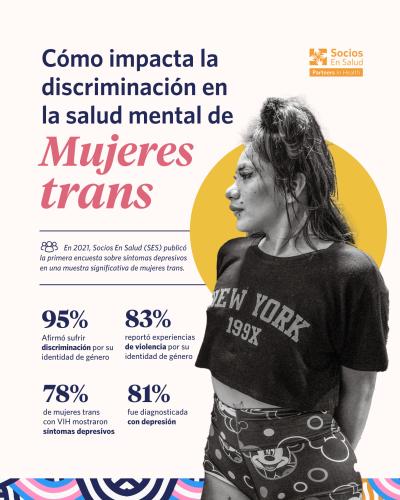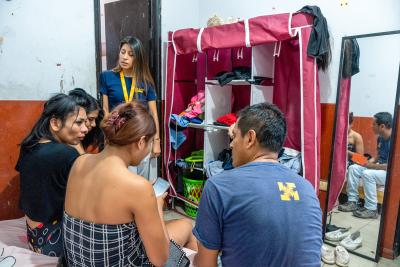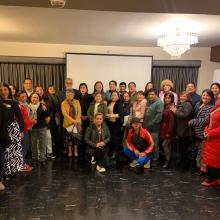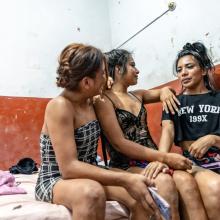More and more LGTBIQ+ people - lesbian, gay, trans, bisexual, intersex, queer and other identities - are proudly celebrating who they are, but many still face barriers when seeking medical care. In Peru, 46% of trans women say they have been discriminated against at least once in their lives, including in healthcare settings, according to a 2023 Partners In Health survey.
In Peru, the challenges are also profound. A national survey, conducted in 2024, revealed that 48% of LGTBIQ+ youth report experiencing discrimination because of their identity, and more than 45% did not access mental health services when they needed them, either due to lack of resources or fear of reprisals in facilities.
Alongside this is a lack of preparedness in the healthcare system. A review published in The Lancet Global Health showed that most health professionals in Latin America do not receive specific training in care for the LGTBIQ+ community during their academic years. This lack can translate into inadequate care or revictimizing experiences.
At Socios En Salud (SES), we work to ensure that no identity is a reason for exclusion in health. We accompany historically marginalized communities from a comprehensive approach, prioritizing respect, listening and quality of care. During Pride Month, we renew our commitment to equitable care free of discrimination. We promote spaces that care not only for the body, but also for the dignity and identity of each person.

Un estudio elaborado por Socios En Salud encontró vínculos entre la salud mental y el trasfondo social en el que viven las mujeres trans.
What does a safe health space for LGTBIQ+ people imply?
A safe health space ensures that no one is judged or exposed because of their sexual orientation or gender identity. Safety starts with respect, dignified treatment and confidentiality. It also requires professionals trained to care without prejudice and knowledgeable about specific needs.
In these spaces, identities are validated, names and pronouns are respected, and privacy is guaranteed. Care includes access to preventive services, mental health care and sustained accompaniment. Inclusion is not an add-on: it is an essential condition for truly ethical and effective care.
Talking about safe spaces also means recognizing the value of listening, empathy and ongoing training. It means protecting people’s autonomy and guaranteeing them care without symbolic violence or imposed silences. In such an environment, care becomes mutual trust.

En el Policlínico Socios En Salud (POLSES), personas LGTBIQ+ acceden a atención médica integral en un entorno seguro, sin prejuicios y con respeto a su identidad.
Foto de SES
How does Socios En Salud ensure access to inclusive healthcare?
At Socios En Salud, we believe that dignified care begins with the recognition of diversity. That is why we work so that LGTBIQ+ people find in the health system a safe place, free of discrimination and with services designed for their real needs.
A concrete example is the Policlínico Socios En Salud (POLSES), in East Lima, where inclusive and respectful medical care is offered. There, more than 400 transgender women accessed health services last year, including hormone replacement therapy, which is currently only provided at this center on a regular and safe basis in the country. POLSES is a stigma-free space, where accompaniment, confidentiality and dignified treatment are prioritized.
Our commitment also extends through the HIV and STI Program, which promotes comprehensive care -clinical, psychological and social- for the prevention, detection and treatment of sexually transmitted infections. This model seeks that more people have early access to diagnosis and antiretroviral therapy (HAART), without obstacles or prejudices.
In addition, we work with health professionals and communities to generate changes in the system from within: we provide training on sexual and gender diversity, raise awareness of the health rights of the LGTBIQ+ population and promote the creation of more inclusive care modules in public health facilities.

El equipo de JunTrans realiza una búsqueda activa entre la población transgénero para sensibilizar a la comunidad y alcanzar una mayor adherencia al sistema de salud.
Pride, care and transformation
Moving towards truly accessible health involves reviewing practices, listening to experiences and acting with commitment. LGTBIQ+ people deserve spaces where they do not have to explain or justify who they are. Health care must adapt to diversity, not the other way around.
Pride Month reminds us how urgent it is to guarantee rights and not just recognize them. It also allows us to make transformative practices visible, showcase real partnerships and expand the reach of inclusive models that are already working. Change is not immediate, but it is possible and necessary.
From Socios En Salud, we will continue to work with communities, institutions and health professionals to strengthen safe environments. We do so with conviction, but, above all, with the certainty that health is meaningless if it does not embrace freedom, mutual care and the right to be.



